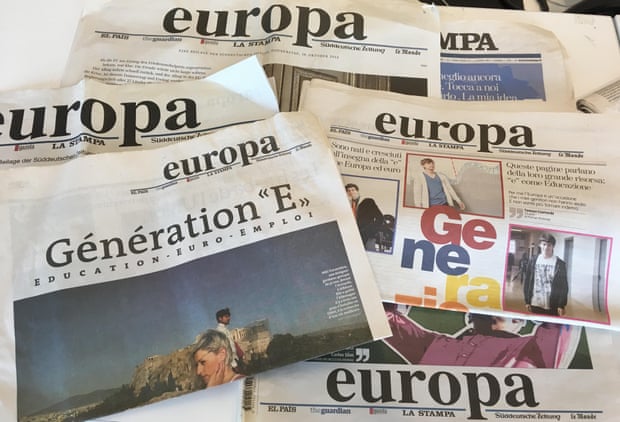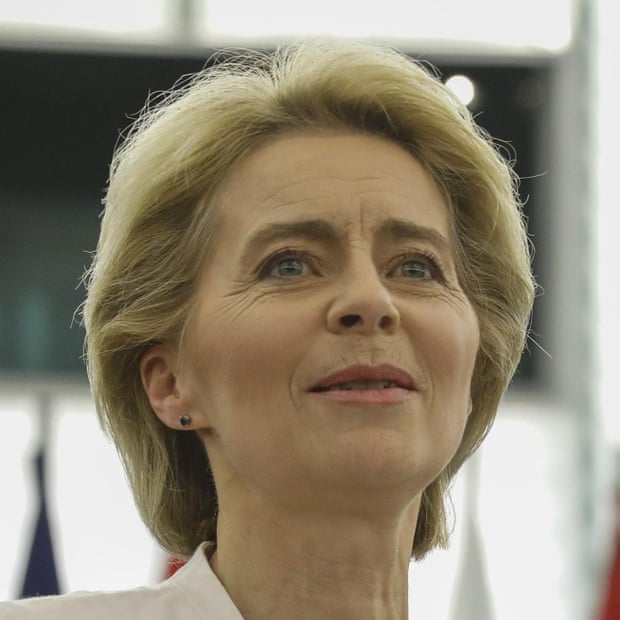The European commission’s new president has said a hard Brexit would have “massively negative consequences” for both Britain and the EU, and said Brussels could provide emergency help for nations such as Ireland that bear the brunt of such an outcome.
In her first interview since narrowly being approved for the post by the European parliament on Tuesday, Ursula von der Leyen said the withdrawal deal concluded between Theresa May and the commission’s chief Brexit negotiator, Michael Barnier, would remain the basis of any future talks.
“We don’t want a hard Brexit, it’s a bad outcome for both sides. We have a good withdrawal agreement,” she said in an exclusive interview with the Guardian and four other European newspapers.
Both of the contenders to succeed May, Boris Johnson and Jeremy Hunt, have vowed to renegotiate the exit deal with the EU, declaring that the most controversial component, the Northern Ireland backstop, is unacceptable.
When asked about their position, Von der Leyen said the withdrawal agreement was “not dead”. She said: “No, it is a good agreement, which was negotiated properly in accordance with the red lines drawn by the British government.”
She reiterated her view that the EU should consider extending the current Brexit deadline of 31 October if there were “good reasons” to do so. “A Brexit without a deal comes with massively negative consequences for both sides, not to mention what it means for Ireland. That’s why we need to do everything to strive for an orderly Brexit. And that’s why if there are good reasons for an extension coming from our British friends, I am open to listening to them.”
She added: “It would be wrong to see Brexit only as the end of something. The way in which we carry out Brexit will determine our future relationship to our neighbour the United Kingdom. For both sides it is of the highest interest that there is an orderly and good beginning to our future relationships.”
In a wide-ranging interview conducted inside the defence ministry in Berlin that she presided over for six years, Von der Leyen told the Europa group of newspapers that the EU would show solidarity with member states hardest hit by a disorderly British exit.
Q&AWhat is the Europa project?
Show

In 2012, six major European newspapers came together to launch joint editorial projects to dig deeper into pan-European issues, understand the EU better and investigative the good and bad things emerging from the continent.
Since then, we have jointly investigated the environment, youth unemployment, Brexit, immigration, euroscepticism, the eurozone the Brussels bureaucracy - and even the legacies of the first world war.
We have interviewed prime ministers and presidents, as well as a host of EU leaders, and will continue our efforts long after Britain has left the EU.
The six papers are The Guardian, Le Monde, Süddeutsche Zeitung, La Vanguardia, La Stampa and Gazeta Wyborcza
She said a European unemployment benefit reinsurance scheme, modelled on measures put in place in Germany to cushion the blow of the world financial downturn a decade ago, could be rolled out across the bloc of 27 nations.
In 2008 the German government prevented massive job cuts through a state-subsidised programme to finance reduced working hours. “We can apply this idea to the whole of Europe,” said Von der Leyen. “Should an external shock such as a disorderly Brexit hit two or three countries particularly hard, for example, the unemployment reinsurance scheme could come into force.”
One recent report said a no-deal Brexit could do massive harm, especially to the economy in Ireland where it could cost £6bn and lead to an estimated increase in unemployment of 50,000 to 55,000.
Asked whether Ireland could be one of the countries to benefit from such emergency help in the case of a no-deal Brexit, Von der Leyen said: “I can’t predict that. But it is right for Europe to help the member states who are hit hardest.”
A mother of seven who has held ministerial posts under the German chancellor, Angela Merkel, since 2005, Von der Leyen became the commission’s first female president-elect on Tuesday, winning a vote in the European parliament with the support of 383 MEPs, only nine votes more than required to secure an absolute majority. Critics say the vote has left her at the mercy of nationalists and populists in Poland and Italy who supported her candidacy.
“The work is only about to begin,” she said. “In my debates with the political groups and national delegations I came across a lot of openness for constructive collaboration, also from the Green parties. Climate change, digitalisation, the economy, Brexit, security, trade, migration – we have work to do.”
In an effort to win votes from Green MEPs, Von der Leyen pledged to make fighting the climate crisis a priority under her presidency. Some have speculated that her ambitious promises on emissions targets may have led some members of the conservative EPP bloc to reject her in Tuesday’s secret ballot. She proposed reducing greenhouse gas emissions by 55% on 1990 levels by 2030. The current target is 40%.
Von der Leyen, a Christian Democrat, said she believed action on climate to be of the utmost urgency. “The worst-case scenario will come about if we don’t act with determination, namely rapidly intensifying climate change with all its consequences. The clock is ticking, and we have to act.”
She added: “Polluting the environment has to come at a price, which will bring about a change in our behaviour and a lowering of CO2 emissions. If you compare it to the rest of the world, then our industry is already doing well at climate-friendly technology, but we have to get better.
“But if industry modernises, we also have to protect it from cheap imports produced in environmentally harmful ways outside Europe’s borders. In coal-heavy regions, especially in central and eastern Europe, we have to support the transition to new clean branches of the economy and protect jobs.”
ProfileWho is Ursula von der Leyen?
Show

Ursula von der Leyen has been president of the European Commission since 1 December 2019. Born in 1958, is the daughter of Heidi and Ernst Albrecht, the latter having been a senior politician in the centre-right Christian Democratic Union who rose to be governor of the state of Lower Saxony.
She spent the first 12 years of her life in Brussels, where her father was serving as a commission official. She studied economics at the universities of Göttingen and Münster before attending the London School of Economics where she used the pseudonym Rose Ladson because she was seen as a potential target for West German leftwing extremists.
Von der Leyen then read for a medical degree, becoming a gynaecologist, and only entered politics at 42. A mother of seven, she has held government positions as labour and family affairs minister, driving forward key policies on gender quotas for company boards and improved maternity and paternity pay and rights.
As commission president, Von der Leyen will represent the EU on the world stage, and her key tasks include building a working relationship with Donald Trump’s White House, and dealing with the next stage of post-Brexit trade negotiations with the UK.
Daniel Boffey in Brussels and Philip Oltermann in Berlin
She indicated a more nuanced approach towards states such as Poland and Hungary, which have been brazenly challenging the EU consensus on issues such as migration, the rule of law and press freedom.
“I think we have to properly listen to the arguments. For example, the Poles make the justified point that they have taken in 1.5 million people from the Ukraine – a country that has for years been the site of a hybrid war in which people are still dying. We must not ignore that.
“Also, the member states who want to go ahead [with a refugee distribution scheme] are already in the process of finding solutions. But it remains the case that in different areas every member state needs the solidarity of the others. We need a fair sharing of the burden – maybe in different areas for different countries.”
Among Brexiters, Von der Leyen has been characterised as a cartoon Eurocrat intent on building “a centralised, undemocratic, updated form of communism”, as the Brexit party leader, Nigel Farage, said in the parliament. She once told an interviewer that her dream was “a united states of Europe – run along the lines of the federal states of Switzerland, Germany or the USA”.
Asked whether her dream had changed since then, she said: “It has become more mature and more realistic. In the European Union we have unity in diversity. That is something different to federalism. I think that is the right path.”
